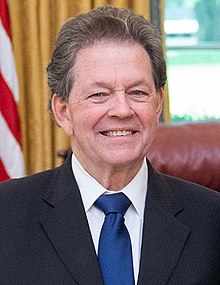Arthur Laffer | |
|---|---|
 Laffer at the White House in 2019 | |
| Born | Arthur Betz Laffer August 14, 1940 Youngstown, Ohio, U.S. |
| Education | Yale University (BA) Stanford University (MBA, PhD) |
| Academic career | |
| Field | Political economics |
| School or tradition | Supply-side economics |
| Doctoral advisor | Ronald McKinnon |
| Contributions | Laffer curve |
| Awards | Presidential Medal of Freedom (2019) |
| This article is part of a series on |
| Conservatism in the United States |
|---|
 |
Arthur Betz Laffer (/ˈlæfər/;[1] born August 14, 1940) is an American economist and author who first gained prominence during the Reagan administration as a member of Reagan's Economic Policy Advisory Board (1981–1989). Laffer is best known for the Laffer curve, an illustration of the theory that there exists some tax rate between 0% and 100% that will result in maximum tax revenue for government. In certain circumstances, this would allow governments to cut taxes, and simultaneously increase revenue and economic growth.
Laffer was an economic advisor to Donald Trump's 2016 presidential campaign.[2] In 2019, President Trump awarded Laffer with the Presidential Medal of Freedom for his contributions in the field of economics.[3]
- ^ "Laffer curve | Define Laffer curve at Dictionary.com". Dictionary.reference.com. Archived from the original on October 25, 2012. Retrieved December 13, 2012.
- ^ Advisors to Trump, archived from the original on May 15, 2017, retrieved May 15, 2017
- ^ "President Donald J. Trump to Award the Medal of Freedom". The White House. Archived from the original on January 20, 2021. Retrieved June 20, 2019.